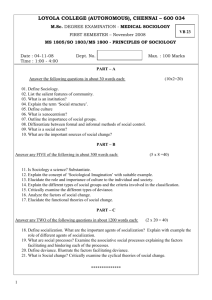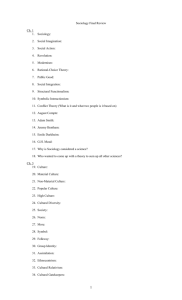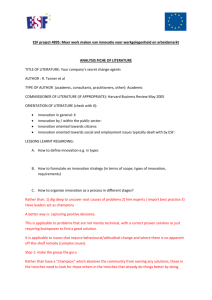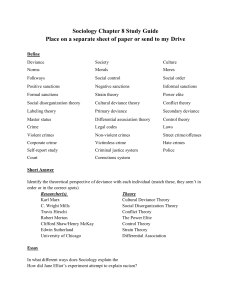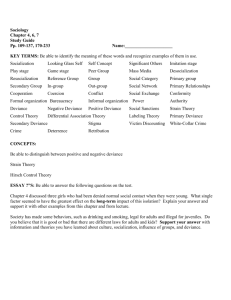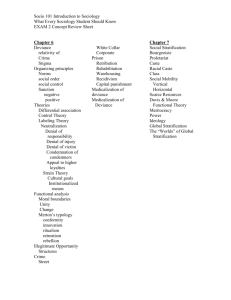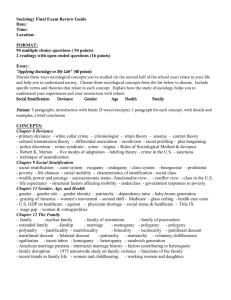Winter 2012 Syllabus
advertisement
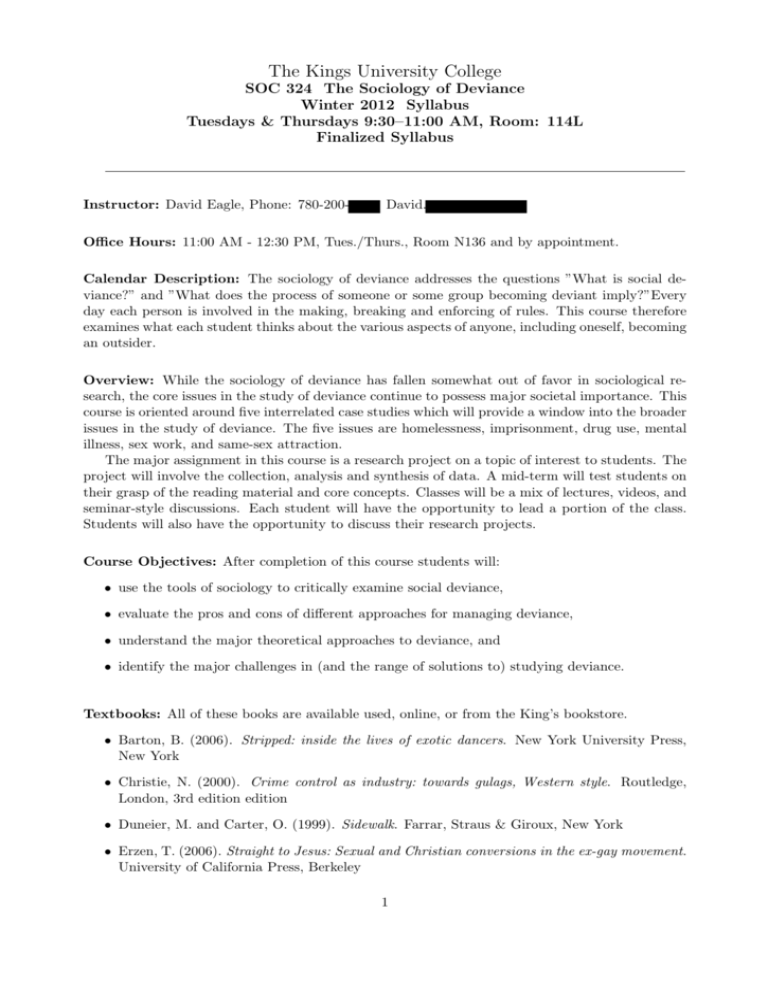
The Kings University College SOC 324 The Sociology of Deviance Winter 2012 Syllabus Tuesdays & Thursdays 9:30–11:00 AM, Room: 114L Finalized Syllabus Instructor: David Eagle, Phone: 780-200- David. Office Hours: 11:00 AM - 12:30 PM, Tues./Thurs., Room N136 and by appointment. Calendar Description: The sociology of deviance addresses the questions ”What is social deviance?” and ”What does the process of someone or some group becoming deviant imply?”Every day each person is involved in the making, breaking and enforcing of rules. This course therefore examines what each student thinks about the various aspects of anyone, including oneself, becoming an outsider. Overview: While the sociology of deviance has fallen somewhat out of favor in sociological research, the core issues in the study of deviance continue to possess major societal importance. This course is oriented around five interrelated case studies which will provide a window into the broader issues in the study of deviance. The five issues are homelessness, imprisonment, drug use, mental illness, sex work, and same-sex attraction. The major assignment in this course is a research project on a topic of interest to students. The project will involve the collection, analysis and synthesis of data. A mid-term will test students on their grasp of the reading material and core concepts. Classes will be a mix of lectures, videos, and seminar-style discussions. Each student will have the opportunity to lead a portion of the class. Students will also have the opportunity to discuss their research projects. Course Objectives: After completion of this course students will: • use the tools of sociology to critically examine social deviance, • evaluate the pros and cons of different approaches for managing deviance, • understand the major theoretical approaches to deviance, and • identify the major challenges in (and the range of solutions to) studying deviance. Textbooks: All of these books are available used, online, or from the King’s bookstore. • Barton, B. (2006). Stripped: inside the lives of exotic dancers. New York University Press, New York • Christie, N. (2000). Crime control as industry: towards gulags, Western style. Routledge, London, 3rd edition edition • Duneier, M. and Carter, O. (1999). Sidewalk. Farrar, Straus & Giroux, New York • Erzen, T. (2006). Straight to Jesus: Sexual and Christian conversions in the ex-gay movement. University of California Press, Berkeley 1 • All articles and supplementary readings are found online at http://www.duke.edu/ dee4/deviance. The username is: deviant; the password is: weirdo. Assignments: PLEASE SUBMIT ALL ASSIGNMENTS TO: David. Mini-assignments: I will give a series of mini-assignments in class as the term progresses. These are meant to help stimulate discussion and will count towards your class participation grade. Mid-Term: February 16th, 2012. This in-class exam will consist of several short answer questions and one longer essay-style question (you will be able to choose from two or three options). If you have kept up with the reading and paid attention in class, you should not have to study. I prefer students to complete the test electronically. If you do not have a laptop and cannot arrange for one, a paper-exam will be made available. Leading Class Discussion: Each student will be required to lead a 20–30 minute class discussion on that day’s reading. In order to prepare for this exercise, you will need to complete the reading, outline the main points of the reading, pick out some topics that you think are useful to discussion, and prepare an outline of the class discussion. I ask that you hand in your typed notes after class. I will circulate a signup sheet. Research Project: The bulk of the class is organized around completing a major research project. A successful project will: 1) Investigate a topic of central to the study of deviance. 2) Formulate a concise, clear, and answerable research question. 3) Analyse some “empirical” data (this could be surveys, historical archives, interviews, quantitative datasets). 4) Organize your findings in a clear and coherent fashion. 5) Present your findings to the class. I’ve placed several key milestones to aid in the successful completion of the project. Students may work in groups. • Milestone 1 (DUE: January 24th): Research Question Proposal. Students will formulate two questions in deviance that they find intellectually stimulating and feasible to tackle within the constraints of a one-semester course. Under each question, the student will describe why this is a question that is significant to study (max 1 page, double-spaced per question) and hand them in. The instructor will review these questions for suitability. Once the student has at least one suitable question, the instructor will meet with the student to discuss the topic in greater depth and help locate data sources. I will circulate a signup for meetings. • Milestone 2 (DUE: February 14th): Project Proposal. Students will then write and submit a project proposal of approximately 3 double-spaced pages. This report includes three major sections. (1) The research question, locating the research question in the field, and explaining the significance of the question. (2) The data, where it comes/will come from, and the connection between the data and the proposed question. (3) The methodological/analytical approach that you will employ. • Milestone 3 (DUE: March 29th): Results. Students will submit the results of their data analysis to the instructor. This section should include a description of the data and the method and detail the significant findings. Figures, graphs, quotations, etc. should communicate the key findings clearly. Length: max 4 pages, double-spaced. 2 • Milestone 4 (April 10, 12, 17): Final Project. The final project will consist of a formal presentation of the question, significance, results, and discussion/conclusions. The presentations must be 15 minutes in length and no longer. Breakdown of Grades: Class Participation: . . . . . . . . . . . . . . . . . . . . . . . . . . . . . . . . . . . . . . . . . . . . . . . . . . . 30% Midterm Exam:. . . . . . . . . . . . . . . . . . . . . . . . . . . . . . . . . . . . . . . . . . . . . . . . . . . . . . .25% Leading Class Discussion: . . . . . . . . . . . . . . . . . . . . . . . . . . . . . . . . . . . . . . . . . . . . . . 5% Final Project: . . . . . . . . . . . . . . . . . . . . . . . . . . . . . . . . . . . . . . . . . . . . . . . . . . . . . . . 40% BONUS: Attend IS Conference: . . . . . . . . . . . . . . . . . . . . . . . . . . . . . . . . . . . . . . . . 5% Grade Policy: I will grade all of your work. Before assignments are due, I will distribute a grading rubric, which outlines how I will evaluate each assignment. As a grader, I am not perfect. If you have questions or concerns about how an assignment was evaluated, please speak to me during office hours. However, please note that it is not my normal policy to change grades unless an egregious error has been committed. If you do all the work and display reasonable interest and effort, you will do fine. Use of Electronics in Class: In order to promote an environment where we all can learn, I kindly ask the following of you: (1) Turn your cellphones off or on silent. Do not text, surf, talk, tweet, etc. on your phone during class. (2) If your laptop is open, it is to be used for taking notes and referencing readings. Please, no email, updating your facebook profile, or internet surfing. If either of these rules become a problem, then no electronics will be allowed in class. Academic Honesty: As a Kings University student your work is expected to be either (1) your own; (2) properly cited if not your own. Any suspected case of plagarism or academic dishonesty will be reported to Jerry Mathis. The penalty for the first instance of plagiarism as a Kings student is failing the assignment which you plagiarized (with or without opportunity to re-write). A second offense as a Kings student is failing the course. If you are feeling tempted to plagiarize, DON’T. Talk to me if you need help, are feeling overwhelmed, or just can’t finish an assignment. Caveat: This is a class on deviance. By nature, the course deals with controversial material. In this course we will explore in depth crime, drug use, and sexual behavior. Some of the readings and videos will contain explicit language. Some of the visual material will contain nudity, and depictions of crime and drug use. Some of the opinions expressed in class and in the class materials may be critical of a “traditional” or a Christian approach to these subjects. You may find yourself questioning some of you deeply held convictions about these topics. You may find yourself frustrated that the course does not offer a Christian apologetic or moral framework. This is a course in sociology: it is an attempt to think critically about how society defines and manages individual behavior that it sees as “bad.” My goal is to help you think through these issues using a sociological perspective. As such, we need to back away from moral and normative perspectives and think about how deviance operates in society. I encourage integrative work—we all need to sort out how we will respond and how our faith communities will respond to the subjects we touch on in class—but that is not my primary aim. If you feel uncomfortable will this caveat, please talk to me or email me. The success of this course depends on us being able to set our moral judgments aside in order to approach these topics in a new light. 3 Attendance Policy: I take class attendance seriously and I expect you to attend every class session. I do understand that we all run into situations beyond our control that may require absence from class. If this situation arises, I ask that you email me before or as soon as possible after class to tell me that you will not be in attendance and the reason for your absence. Ski trips(!), hangovers, and too much homework are not excusable absences. Missing more than one class without cause may result in receiving a failing grade for the attendance portion of the class. Finally, it is in your best interest to attend class. I do not make class notes available electronically, and some of the material we cover in class will wind up on the exam. Enough said. Disability Policy: If you have a disability that requires special considerations, please visit the Student Life office and talk to Kristin Lemke (kristin. The full disability policy at Kings University can be found at: http://www.kingsu.ca/student-life/disability-services.html. Important Dates: Add/Drop Deadline with full refund . . . . . . . . . . . . . . . . . . . . . . . . . . . January Drop Deadline with partial refund . . . . . . . . . . . . . . . . . . . . . . . . . . . . . January Research questions due . . . . . . . . . . . . . . . . . . . . . . . . . . . . . . . . . . . . . . . . January Project Proposals Due . . . . . . . . . . . . . . . . . . . . . . . . . . . . . . . . . . . . . . . February Midterm Test . . . . . . . . . . . . . . . . . . . . . . . . . . . . . . . . . . . . . . . . . . . . . . . . February Results Summary Due . . . . . . . . . . . . . . . . . . . . . . . . . . . . . . . . . . . . . . . . . . March Project Presentations . . . . . . . . . . . . . . . . . . . . . . . . . . . . . . . . . . . . . April 10, 12, 12 25 26 14 16 29 17 Course Outline: January 10th . . . . . . . . . . . . . . . . . . . . . . . . . . . . . . . . . . . . . . . . . . . . . . . . . . . . . . . . . Introductions January 12th . . . . . . . . . . . . . . . . . . . . . . . . . . . . . . . . . . . . . . . . . . . . . . . . . . . . . . . . . . . . . Cancelled January 17th . . . . . . . . . . . . . . . . . . . . . . . . . . . . . . . . . . . . . . . . . . . . . . . . . Theories of Deviance Readings: • Sutherland, E. H. (1950). The diffusion of sexual psychopath laws. American Journal of Sociology, 56(2):142–148 • Merton, R. K. (1938). Social structure and anomie. American Sociological Review, 3(5):672–682 January 19th . . . . . . . . . . . . . . . . . . . . . . . . . . . . . . . . . . . . . . . . . . . . . IS Conference—No Class January 24th . . . . . . . . . . . . . . . . . . . . . . . . . . . . . . . . . . . . . . . . . . . . . . . . . . . . Studying Deviance Readings: • Goode, E. (2002). Sexual involvement and social research in a fat civil rights organization. Qualitative Sociology, 25(4):501–534 • Williams, C. L. (2002). To know me is to love me? response to Erich Goode. Qualitative Sociology, 4:557 – 560 • Saguy, A. C. (2002). Sex, inequality, and ethnography: Response to Erich Goode. Qualitative Sociology, 25(4):549–556 • Warwick, D. P. (1973). Tearoom trade: Means & ends in social research. The Hastings Center Studies, 1(1):27–38 4 January 26th . . . . . . . . . . . . . . . . . . . . . . . . . . . . . . . . . . . . . . . . . . . . . . . . . . . . . . . . Urban Poverty Video, Carts of Darkness Reading: Duneier, pages 1–80 Research Questions DUE January 31st . . . . . . . . . . . . . . . . . . . . . . . . . . . . . . . . . . . . . . . . . . . . . . approx Urban Poverty II Reading: Duneier, pages 81–154 February 2nd . . . . . . . . . . . . . . . . . . . . . . . . . . . . . . . . . . . . . . . . . . . . approx Urban Poverty III Reading: Duneier, pages 155–228 February 7th . . . . . . . . . . . . . . . . . . . . . . . . . . . . . . . . . . . . . . . . . . . . . . . . . . . . Urban Poverty IV Reading: Duneier, pages 229–317 (318–330 optional) February 9th . . . . . . . . . . . . . . . . . . . . . . . . . . . . . . . . . . . . . . . . . . . . . . . . . . . . . . . . . . . . . Drug Use Reading: • Stanley, E. (1931). Marihuana as a developer of criminals. The American Journal of Police Science, 2(3):252–261 • Becker, H. S. (1953). Becoming a marihuana user. American Journal of Sociology, 59(3):235–242; and • Schaller, M. (1970). The federal prohibition of marihuana. Journal of Social History, 4(1):61–74 Video: Peter Jennings, Ecstasy Rising February 14th . . . . . . . . . . . . . . . . . . . . . . . . . . Dealing with Deviants—The Prison System Reading: Christie 7–40 Project Proposals DUE February 16th . . . . . . . . . . . . . . . . . . . . . . . . . . Dealing with Deviants—The Prison System Reading Christie, pages 41–78 Video, The Stanford Prison Experiments February 18th–26th . . . . . . . . . . . . . . . . . . . . . . . . . . . . . . . . . . . . . . . . . . . . . . . . . Reading Week February 28th . . . . . . . . . . . . . . . . . . . . . . . . . . Dealing with Deviants—The Prison System Reading Christie, pages 79–110 March 1st . . . . . . . . . . . . . . . . . . . . . . . . . . . . . . Dealing with Deviants—The Prison System Reading Christie, pages 111–150 March 6th . . . . . . . . . . . . . . . . . . . . . . . . . . . . . . Dealing with Deviants—The Prison System Reading Christie, pages 150–202 March 8th . . . . . . . . . . . . . . . . . . . . . . . . . . . . . . Dealing with Deviants—The Prison System Special Guest Lecture: Restorative Justice, Carla Giesbrecht Readings TBA March 13th . . . . . . . . . . . . . . . . . . . . . . . . . . . . . . . . . . . . . . . . . . . . . . . . . . . . . . . . . Midterm Exam 5 March 15th . . . . . . . . . . . . . . . . . . . . . . . . . . . . . . . . . . . . . . . . . . . . . . . . . . . . . . . . . . . . . Sex Work I Reading: Barton, pages ix–40 March 20th . . . . . . . . . . . . . . . . . . . . . . . . . . . . . . . . . . . . . . . . . . . . . . . . . . . . . . . . . . . . Sex Work II Reading: Barton, pages 41–88 March 22nd . . . . . . . . . . . . . . . . . . . . . . . . . . . . . . . . . . . . . . . . . . . . . . . . . . . . . . . . . . . Sex Work III Reading: Barton, pages 89–128 Video: Live Nude Girls Unite! March 27nd . . . . . . . . . . . . . . . . . . . . . . . . . . . . . . . . . . . . . . . . . . . . . . . . . . . . . . . . . . . Sex Work IV Reading: Barton, pages 129–166 March 29th . . . . . . . . . . . . . . . . . . . . . . . . . . . . . . . . . . . . . . . . . . . . . . . . . . . . . . . . Homosexuality I Reading: Erzen, pages ix–51 Video: No Cure for Love April 3rd . . . . . . . . . . . . . . . . . . . . . . . . . . . . . . . . . . . . . . . . . . . . . . . . . . . . . . . . . Homosexuality II Reading: Erzen, pages 52–84 Results Summary DUE April 5th . . . . . . . . . . . . . . . . . . . . . . . . . . . . . . . . . . . . . . . . . . . . . . . . . . . . . . . . . Homosexuality III Reading: Erzen, pages 85–159 April 10th . . . . . . . . . . . . . . . . . . . . . . . . . . . . . . . . . . . . . . . . . . . . . . . . . . . . . . . . Homosexuality IV Reading: Erzen, pages 160–230 April 12th . . . . . . . . . . . . . . . . . . . . . . . . . . . . . . . . . . . . . . . . . . . . . . . . . . . . . . . . . . . . Presentations April 17th . . . . . . . . . . . . . . . . . . . . . . . . . . . . . . . . . . . . . . . . . . . . . . . . . . . . . . . . . . . . Presentations 9:00am–11:00am SATURDAY, April 21st . . . . . . . . . . . . . . . . . . . . . . . . . . . . . Presentations 6
